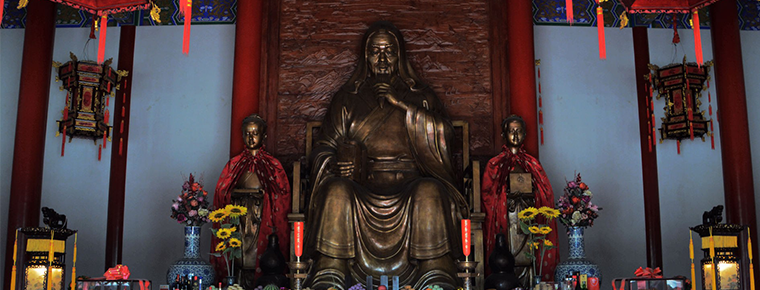Hu Yiyang Legend
Hu Yiyang Legend
Hu Yiyang (about 1639-1718) is a good prime minister. He is a native of Liuting Village, Renhua Township, Moxian County (now Liuting Street, Chengyang District, Qingdao City). All his life, he did not become an official, but taught and apprenticed as his career. He is the author of Yixiang Enlightenment, Yijing Zhengshi, Jiezhi Mengtu Shuo, Liuxi Fragments, Cold Night Collection and so on.
brief introduction
Hu Yiyang (about 1639-1718) is a good prime minister with the character of Yiyang, a native of Jimo in Qingdao, Shandong Province (now Liuting Town, Chengyang District). All his life, he did not become an official, but taught and apprenticed as his career. "Family is very poor, one does not take, Peng room urn, leisurely and comfortable. Elegant workmanship and craftsmanship are regarded as a way of making progress. It can be seen that this is a scholar who pursues something quite different from the general feudal scholar-bureaucrats. Hu Yiyang's former residence has been built in Chengyang District.
Folklore
Folk legends are Liyang, Yuyang, Weiyang, Liangtong, Xiangying, Yiyang, Virgin of Yuyu, and Mochengyang in Qing Dynasty. Born in Chongzhen, Ming Dynasty (1639), he studied in Wali and Huijuyuan when he was a teenager. When he was 16 years old in 1655, the gatekeeper forced him to undress his clothes and search his body. He was so angry that he flew away, swearing that he should not try all his life and then set up a hall to teach his apprentices for a living.
contribution
Hu Fuyang is endowed with extraordinary qualities. His intensive study of Zhouyi is different from that of Liluo. The family is very poor, carefully selected, Pengcheng urn, leisurely and self-satisfied. Although elegant workmanship and craftsmanship, but see the road of progress as well, but with Laoshan Baifuan Jiang Qingshan Road long intersect very closely. Hu Yiyang died in 1718 in the fifty-seventh year of Kangxi in the Qing Dynasty. After his death, the Hu clan was honored as the tenth ancestor. Hu Yiyang left behind many anecdotes and anecdotes for future generations. In the Qing Dynasty's Jiaozhou Chronicle, there is Guziyang in the South China Sea of Lingdong Province. Someone here meets an old man who is sailing a boat and wears Taoist clothes with a very ancient appearance. It was more than 40 years since Hu Yiyang died. Hu Yiyang "seventy years, foretelling the end of the disease without illness". The Yi Jing Zheng Shi Jie was not printed at that time, but its manuscript remained. It was not until 300 years after Hu's death that its descendant Hu Pengchang printed it in Beiping.


-
1.Yesanpo Scenic Area Laishui County Baoding
The Yesanpo Scenic Area of Laishui County, Baoding City, Hebei Province, is located in Laishui County, Baoding City. The Taihang Mountains and Yanshan Mountains
Time 2018-11-24 -
2.Three Parallel Rivers of Yunnan Protected Areas
The three rivers running side by side are Jinsha River, Lancang River and Nujiang River, three rivers originating from the Qinghai-Tibet Plateau, running 170 kilometers from north to south in Yunnan P
Time 2018-12-19 -
3.China Maritime Museum
China Navigation Museum, fully known as "Shanghai China Navigation Museum", is the first national navigational Museum approved by the State Council. It is co-constructed by the Ministry of T
Time 2018-12-22 -
4.Ba Shan Bei Er Song
Bashan Beibei Song refers to a traditional folk song which was produced and spread in the area under the jurisdiction of Bazhong City at the southern foot of Micang Mountain in northeastern Sichuan Pr
Time 2019-04-03 -
5.Traditional Building Techniques of Beijing Siheyuan
Beijing quadrangle traditional craftsmanship, Beijing local traditional handicraft, one of the national intangible cultural heritage.
Time 2019-04-04 -
6.Eighteen Sayings on Tibetan Wedding Banquet
The Eighteenth Tibetan Wedding Banquet is a kind of folk oral literature spread in the Tibetan inhabited areas of the eastern agricultural region of Qinghai Province. Its manifestation is the eighteen
Time 2019-04-07 -
7.Haicheng Hornplay
Haicheng trumpet opera, the local traditional drama of Anshan City, Liaoning Province, is one of the national intangible cultural heritage.
Time 2019-05-02 -
8.Hancheng Yangko
Hancheng Yangko, commonly known as "singing Yangko", is a form of singing that integrates folk songs, rap and dance, and derives from traditional opera
Time 2019-05-02 -
9.Napo Zhuang Folk Songs
Napo Zhuang, also known as "Heiyizhuang", is a unique ethnic group among the Zhuang people. It calls itself "Min", "Zhong", "Ouch". Now there are about 518,000
Time 2019-06-06 -
10.Uygur Medicine
Uygur Medicine magazine provides medical workers with good opportunities for education, continuing education and academic exchange platform, and is committed to improving the comprehensive quality of
Time 2019-06-26 -
11.Longhua Baxian Mountain Giant Buddha
Longhua Baxian Mountain Giant Buddha is located in Baxian, Longhua Town, Pingshan County, Yibin City, Sichuan Province. Since the Bamiyan Buddha in Afghanistan was bombed by the Taliban
Time 2020-10-16 -
12.Chengdu Jinsha Site Museum
Chengdu Jinsha Site Museum, a national AAAA tourist attraction, is located at No.2 Jinsha Ruins Road, Qingyang District, Chengdu City, Sichuan Province. It covers an area of 456 Mu and a building area of 38000 square meters.
Time 2020-11-06